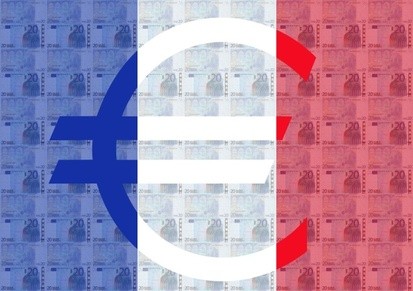Funny about Money

It’s 11 p.m. and I’m ensconced on a fake leather banquette at a restaurant in Saint Germain des Prés, relaxed and comfy after a fine dinner and good wine. In mid-conversation, though, I remember that I have this article to write. Good timing. The two longtime French friends on either side of me are probably the best interviewees I could ever hope to find. Pen poised, I pop the question: “What do you think about the difference in the French and American attitude towards money?” I ask them brightly.
Leaden silence, as a palpable pall fell upon what has been an animated talkfest.
One of my friends looked up in the air as if he’d suddenly seen a fascinating giant bird fly in. The other feigned not to hear. Finally the latter, a former Communist and well-known journalist, turned to me and laughed: “You’ve just got the lead for your story, Harriet. You can say that this is a subject we French don’t like to talk about!” His buddy, one of the wealthiest entrepreneurs in France, agreed: “It’s not in our culture to talk about money.”
You can say that again. I’ve often wondered why, in France, you can animatedly discuss just about everything but loot and lucre. If you want to squelch conversation, clam people up, turn a fun evening into a downer, just bring up money! French journalist François de Closets, a brilliant observer of French behavior, opined that the French silence about money “is not that of indifference, but of passion. It translates into kind of a secret and guilty obsession…a censored desire…a taboo in the strongest sense of the word.”
In other words, the French like money just as much as the rest of us—they just don’t like to talk about it.
This means that if you want to meld into French life, don’t ask people what they do for a living or how much they earn (of course you wouldn’t) or even how the stock market is doing (you might). Babbling about bucks is deemed to be vulgar, tacky and/or boring—except by the nouveaux riches of course, but the nouveaux explains why they haven’t yet figured this out.
One reason for the silence that greets any conversation with a finance theme is a fear of the tax authorities that goes far back in French history. The French have spent centuries devising ways to avoid them. For example, the narrow buildings in the pretty southwestern city of Bayonne have few windows—the more windows, the more the building was taxed.
“The taxman,” says French journalist Isabelle Quenin, “is the big bad wolf.” Flaunting wealth is considered one surefire way to bring on a tax inspection, which is why the French have the saying “Pour vivre heureux, vivons cachés” (to live happily, live hidden).
Ostentatious wealth, of course, may also attract the envy of one’s peers. In the words of the famous fictional character Major Thompson, created by the late French humorist Pierre Daninos, “The American pedestrian who sees a millionaire going by in a Cadillac secretly dreams of the day that he will get in his own. The French pedestrian who sees a millionaire in a Cadillac secretly dreams of the day that he will be able to get him out of the car so that he will walk like everyone else.”
Over the top? Well, this is the country in which François Hollande, the former head of the Socialist Party, looked into the cameras during a 2007 presidential election debate and stated with a straight face: “I don’t like the rich, I have to confess.” When asked how he defined “rich”, he came up with “€4000 a month”. The story died down rapidly, especially after it became clear that Hollande himself was quite “rich” by his own standards. But the anecdote showed that class war and disapproval of rampant capitalism are far from dead. One survey showed that 60% of the French have a good image of the heads of companies with fewer than 250 employees; however, a mere 25% have a good image of multinational managers. When asked to whom companies should be responsible, almost 80% answered “to clients and employees” and only 6% “to shareholders”.
Things may be changing, though. France’s president, Nicolas Sarkozy, shook some sacred taboos early in his mandate when he spent a few post-election days drifting off the coast of Malta on the yacht of a French millionaire friend, and later whisked his family off to yet another millionaire’s hideaway in the US. Quelle horreur! Well-heeled friends, Ray-Ban sunglasses, Dior suits, Breitling watch, weekends in Deauville, a victory dinner at flashy Fouquet’s—the new French chief seemed out to show that he, at least, has no complexes about money.
Sarkozy may succeed in chipping away at this unique French taboo. But there’s one thing even a French president might not be able to do and that is to get some kind of equation between service and money. Logically, if you use your hard-earned money to buy something, you expect some service, attention from the sales staff, perhaps even a smile. In France, this is up for grabs.
Many visitors, and certainly all of us who live here, have dozens of anecdotes about odd French notions of customer service—salespeople chatting away with one another while clients cool their heels, or the waiter who assiduously clears up every empty table but never looks your way.
Years ago, in his book The French, Sanche de Gramont told of a saleswoman in a stationery store who in winter greeted customers with “Shut the door quickly, you are letting the heat out.” “The customer,” concluded de Gramont, “is that barely tolerable nuisance who is responsible for drafts.”
Not always, of course. Some customer service in France is exquisite, close to perfection. But, as my French husband points out, “In France, it isn’t about money. It’s about relationships.” That’s a stunner for most Americans, for whom business is business, time is money and the customer is always right.
Here, building up relationships with shopkeepers does have its rewards. Now that I am very thick with my local cheese vendor, he won’t sell me a fromage I ask for if it’s not in season or up to standard that day. He’ll steer me to something better. If I didn’t know him—or rather, if he didn’t know me—he’d sell me whatever.
Back to my night at the restaurant, I asked my French friends one final question. “What do you think about President Sarkozy urging the French to ‘work more to make more’?”
“Revolutionary!” my journalist friend piped up, adding with a wink, “Personally, my slogan is to work less to make more!” And then, barely concealing his joy, he changed the subject.
Originally published in the January 2008 issue of France Today; updated in March 2011
Share to: Facebook Twitter LinkedIn Email
Leave a reply
Your email address will not be published. Required fields are marked *



